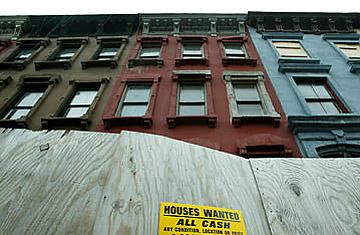
Seen in decades past as a solution to housing low income residents, units that fall under federal or state subsidy is under increasing scrutiny and faces opt-outs by owners over the next several years.
Another housing crisis may be looming even as the mortgage meltdown continues and as Americans who once dreamed of home ownership see their properties foreclosed. The Housing Act of 1937, imposed in the wake of the Great Depression, and amended a number of times in the 1970s, is reaching a crossroads — and close to five million Americans who depend on subsidized public housing may soon have to figure out where and how they are going to live.
That's because under the provisions of Section 8 of the historic law a significant change will be under way in the next few years. As a result, building owners who participate in the program — receiving subsidies from the Department of Housing and Urban Development in exchange for taking in lower-income renters — will be able to opt out of those contracts. And many are thinking of doing just that. America's two largest cities, New York and Los Angeles, will be severely affected as will many smaller communities.
According to the Department of Housing and Urban Development, as many as 13,000 Section 8 contracts will expire by 2013, meaning 800,000 privately owned buildings could potentially be put up for sale or have the rents on their apartments raised to full market rates. Michael Bodaken, executive director of the National Housing Trust says about 1.5 million apartments housing between three and five million people will be affected. "Generally it's bad for cities to the extent that they lose the needed mixed income and affordable housing resource that is difficult to replace," says Bodaken, whose non-profit group advocates for people who live in subsidized homes.
Qualified tenants (typically ranging from individuals who make $12,500 a year to families of eight who make $22,500 annually) pay only 30% of their monthly adjusted income toward rent. The government makes up the difference to the participating landlords. Many building owners, however, have been suffering from what critics call "HUD fatigue" — frustration with dealing with government bureaucracy when it comes to getting the government to fork over the subsidies. Dean Chaussee, who has owned and managed properties in suburban Seattle through his Westwood Management since 1975, is waiting to opt out of his Section 8 contract when it expires because of what he says is unfair treatment from HUD. "We sign a contract to provide housing for people who otherwise wouldn't be housed by the private sector," he says. "HUD's job is to pay us for doing it, but they are consistently late on their payments." Costs and maintenance increases, furthermore, are not being met by HUD's formula, which Chaussee says is way behind market rate. He is now involved in a lawsuit against the agency. Chausee says he believes as more Section 8 contracts expire, more property owners will opt out of the program. "I know attorneys who are advising their clients to file their opt-out paperwork so they have that option."
